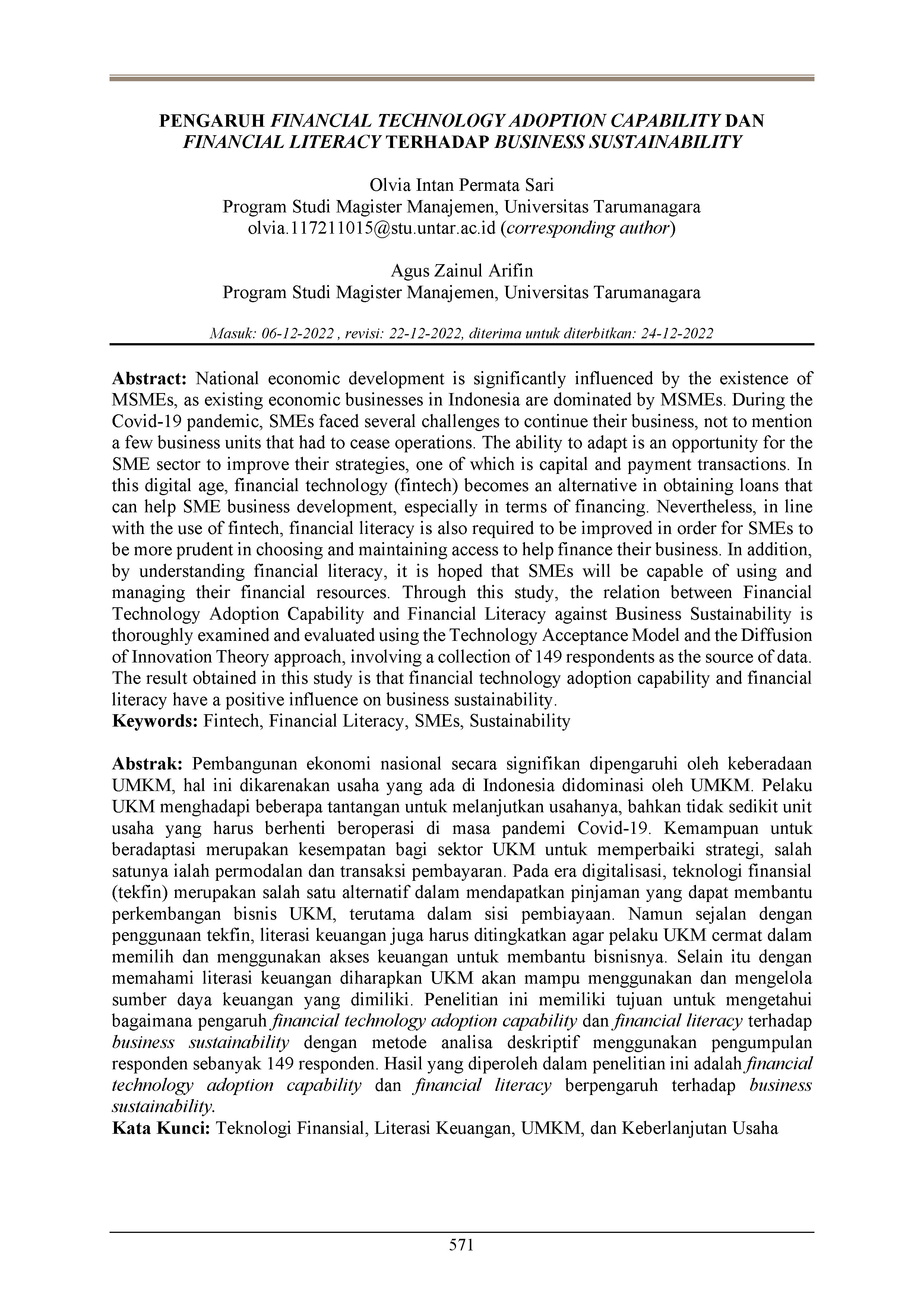Pengaruh financial technology adoption capability dan financial literacy terhadap business sustainability
Main Article Content
Abstract
National economic development is significantly influenced by the existence of MSMEs, as existing economic businesses in Indonesia are dominated by MSMEs. During the Covid-19 pandemic, SMEs faced several challenges to continue their business, not to mention a few business units that had to cease operations. The ability to adapt is an opportunity for the SME sector to improve their strategies, one of which is capital and payment transactions. In this digital age, financial technology (fintech) becomes an alternative in obtaining loans that can help SME business development, especially in terms of financing. Nevertheless, in line with the use of fintech, financial literacy is also required to be improved in order for SMEs to be more prudent in choosing and maintaining access to help finance their business. In addition, by understanding financial literacy, it is hoped that SMEs will be capable of using and managing their financial resources. Through this study, the relation between Financial Technology Adoption Capability and Financial Literacy against Business Sustainability is thoroughly examined and evaluated using the Technology Acceptance Model and the Diffusion of Innovation Theory approach, involving a collection of 149 respondents as the source of data. The result obtained in this study is that financial technology adoption capability and financial literacy have a positive influence on business sustainability.
embangunan ekonomi nasional secara signifikan dipengaruhi oleh keberadaan UMKM, hal ini dikarenakan usaha yang ada di Indonesia didominasi oleh UMKM. Pelaku UKM menghadapi beberapa tantangan untuk melanjutkan usahanya, bahkan tidak sedikit unit usaha yang harus berhenti beroperasi di masa pandemi Covid-19. Kemampuan untuk beradaptasi merupakan kesempatan bagi sektor UKM untuk memperbaiki strategi, salah satunya ialah permodalan dan transaksi pembayaran. Pada era digitalisasi, teknologi finansial (tekfin) merupakan salah satu alternatif dalam mendapatkan pinjaman yang dapat membantu perkembangan bisnis UKM, terutama dalam sisi pembiayaan. Namun sejalan dengan penggunaan tekfin, literasi keuangan juga harus ditingkatkan agar pelaku UKM cermat dalam memilih dan menggunakan akses keuangan untuk membantu bisnisnya. Selain itu dengan memahami literasi keuangan diharapkan UKM akan mampu menggunakan dan mengelola sumber daya keuangan yang dimiliki. Penelitian ini memiliki tujuan untuk mengetahui bagaimana pengaruh financial technology adoption capability dan financial literacy terhadap business sustainability dengan metode analisa deskriptif menggunakan pengumpulan responden sebanyak 149 responden. Hasil yang diperoleh dalam penelitian ini adalah financial technology adoption capability dan financial literacy berpengaruh terhadap business sustainability.
Article Details

This work is licensed under a Creative Commons Attribution-NonCommercial-ShareAlike 4.0 International License.
This work is licensed under a Jurnal Manajemen Bisnis dan Kewirausahaan Creative Commons Attribution-ShareAlike 4.0 International License.
References
Auliya, A. P., Putra, E. R. S., Dewi, S. P., Khairunnisa, Z., Sofyan, M., Arifianti, F., & Rahmawati, N. F. (2022). ONLINE BUSINESS TRANSFORMATION IN THE COVID-19 PANDEMIC ERA (CASE STUDY OF MSME ACTIVITIES IN TANGERANG CITY). International Journal of Economics, Business and Accounting Research (IJEBAR), 6(1).
Azzahra, B., Gede, I., Raditya, A., & Wibawa, P. (2021). Sebagai Katalis Perekonomian Indonesia Dalam Menghadapi Middle Income Trap 2045. Inspire Journal: Economics and …, 75–86. https://ejournal.uksw.edu/inspire/article/download/4856/1771
Beal, D., & Delpachitra, S. (2003). Financial literacy among Australian university students. Economic Papers: A Journal of Applied Economics and Policy, 22(1), 65–78.
Burgelman, R., Christensen, C., & Wheelwright, S. (2009). strategic Management of technology and Innovation Mc-Graw-Hill. New York, NY.
Davis, F. D. (1989). Perceived usefulness, perceived ease of use, and user acceptance of information technology. MIS Quarterly, 319–340.
Ghozali, I., & Latan, H. (2014). Partial Least Squares konsep, metode dan Aplikasi menggunakan program WarpPLS 4.0. Semarang: Badan Penerbit Universitas Diponegoro.
Hair, J. F., Ringle, C. M., & Sarstedt, M. (2011). PLS-SEM: Indeed a silver bullet. Journal of Marketing Theory and Practice, 19(2), 139–152.
Hair Jr, J. F., Sarstedt, M., Hopkins, L., & Kuppelwieser, V. G. (2014). Partial least squares structural equation modeling (PLS-SEM): An emerging tool in business research. European Business Review.
Hayes, R. H., & Abernathy, W. J. (1980). Managing our way to economic decline. Harvard Bus. Rev.;(United States), 58(4).
Iskandar, D. (2019). The use of the financial technology (Fintech) system is reviewed from society perception: Attitude, interest, motivation, experience & hope. International Journal of Multidisciplinary Research, 5(6), 138–148.
Lin, H. (2007). Knowledge sharing and firm innovation capability: an empirical study. International Journal of Manpower.
Lusardi, A., & Mitchell, O. S. (2011). Financial literacy around the world: an overview. Journal of Pension Economics & Finance, 10(4), 497–508.
Pertiwi, U. M. (2020). Penerapan Financial Technology dan Peningkatan literasi keuangan Untuk Strategi Penguatan Bisnis UMKM di Kalimantan Barat. … Dari Https://Pascasarjanafe. Untan. Ac. Id …, 365–376. http://pascasarjanafe.untan.ac.id/wp-content/uploads/2021/01/34.pdf
Rogers, E. M. (1983). Diffusion of Innovations, A Division of Macmillan Publishing Co. Inc. Third Edition, The Free Pres, New York.
Undang-Undang Republik Indonesia Nomor 20 Tahun. (2008). Undang-Undang Republik Indonesia Nomor 20 Tahun 2008. 1.
Zhang-Zhang, Y., Rohlfer, S., & Rajasekera, J. (2020). An eco-systematic view of cross-sector fintech: The case of Alibaba and Tencent. Sustainability, 12(21), 8907.


